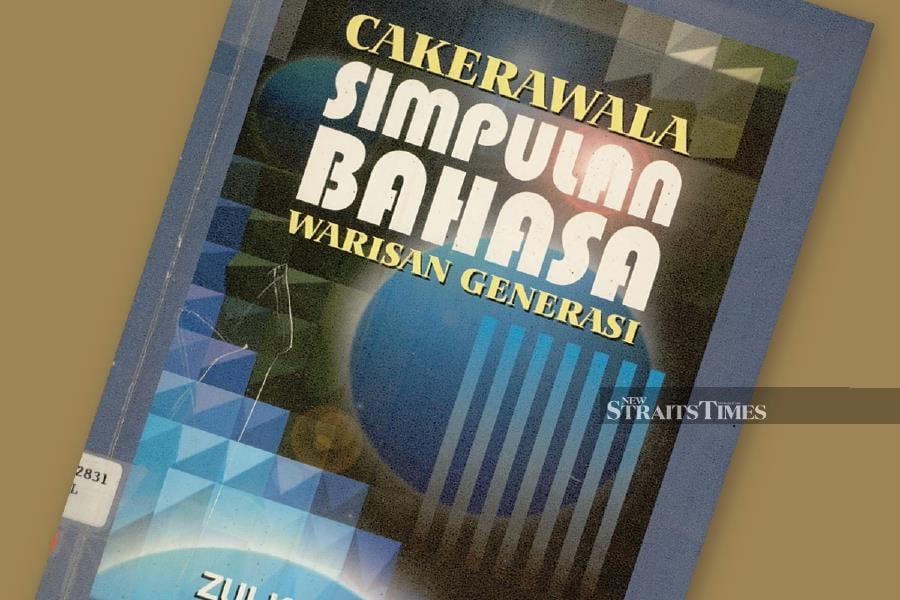MALAYS' psyche and wisdom have always intrigued me when it comes to using peribahasa (proverbs), pantun (poems) and simpulan bahasa (idioms).
Ever since Tun Sri Lanang, who penned Sulalatus-Salatin or Sejarah Melayu in the 14th century, to Malay scholar Pendeta Za'aba, who reinvented the Malay language in the 20th century, we have come to understand and appreciate the language better.
Since time immemorial, Malays have been keen on using idiomatic expressions.
They are two common words combined to make a two-word phrasal expression to describe their thoughts and attitudes, aspirations and anger.
A Western linguist once defined this idiomatic expression as "frozen patterns of language which allow little or no variation in form and often carry meanings which cannot be deduced from their individual components".
In other words, an idiomatic expression can have a literal meaning in one situation and a different idiomatic meaning in another situation.
There's always a suitable simpulan bahasa to be used during any circumstance. Some are meant to educate, tease, taunt and sometimes provoke people.
In the need to survive these difficult times, many Malaysians, especially people in the Bottom 40 income group, are caught in a situation that Malays call "nyawa-nyawa ikan", a predicament where they cannot make ends meet.
Many struggle as they "bermandi peluh" (worked hard) in facing the Covid-19 pandemic.
The pandemic laid bare and made even starker the economic challenges many are facing.
But many are not willing to give up, so they adopt a "berpeluk tubuh" (not doing and achieving anything) stance.
In these challenging times, average Malaysians have to "ikat perut", being prudent in their daily expenses, but sadly people like vagrants and the homeless have resorted to "ikat pinggang", not having proper meals due to extreme poverty.
Some who fall into desperation have become "hilang punca", exhausted all means and avenues.
They sink into a mental state of "hilang akal" as they cannot think of a better way of solving their problem.
Some resort to stealing to feed their family.
In the midst of these challenges, political instability exacerbates the situation.
The Yang di-Pertuan Agong, in his recent speech, used this beautiful old Malay proverb — "bila dah merah, kunyit salahkan kapur, kapur salahkan kunyit" — to describe politicians who blame each other when something goes wrong.
We usually see and hear politicians indulging themselves in "bertikam lidah" (crossing words) with each other, with one side calling the other "lidah bercabang" (double talking), as being deceitful or hypocritical in action and speech.
Politicians make wild and blind accusations, or "serkap jarang", against their opponents without checking the facts first.
They sometimes behave like Netizens influenced by "khabar angin" (hearsay and fake news) rather than fact-checking the stories they hear.
In their discourse, it is rare for them to agree with each other, as they just love to agree to disagree.
Some will just stay "atas pagar" (fence-sitters) without supporting either side, which we will probably see in the coming general election.
Then there are "batu api" and "kacang hantu" (instigators) who like to "adu domba", causing friction between opposing sides.
They just love to "buka tembelang", exposing the wrongdoings of other people.
In cases that involve "makan suap" (bribery) committed by someone who becomes "gelap mata" (unable to resist money or wealth), the culprits will accuse whistleblowers as "mulut tempayan" (a person who leaks secrets).
Inevitably, many politicians like to put on a "muka tembok", unashamed of what they did and when they make silly statements that receive criticism.
Case in point. When a politician said Malaysian football players lost their focus because of excessive cheering by spectators, he lost his "air muka" (respect), and made the fans furious, or "naik angin", getting blamed for the Malaysian team's loss to Bahrain.
Idiomatic expressions are wonderful when we know how and when to use them.
But they can be dangerous as we may libel and slander others if they are misinterpreted.
The writer, a former NST journalist, is a film scriptwriter whose penchant is finding new food haunts






